 My current pet beef (moo) is about sustainable fisheries...both what it means to our oceans and our planet, and what it means to people like us. Well, maybe not exactly like us, because last I checked I wasn't a starving Angola. Also as I write this I'm eating a tuna sandwich and realizing belatedly that I have no idea if the tuna I'm eating was caught in an ethical and sustainable manner. But I digress.
My current pet beef (moo) is about sustainable fisheries...both what it means to our oceans and our planet, and what it means to people like us. Well, maybe not exactly like us, because last I checked I wasn't a starving Angola. Also as I write this I'm eating a tuna sandwich and realizing belatedly that I have no idea if the tuna I'm eating was caught in an ethical and sustainable manner. But I digress.In the Mediterranean Bluefin Tuna have been so overfished that the population is in danger of collapsing completely. First and foremost that means there'll be no more tuna. But what else does it mean, and what problems has it caused along the line? Consider that fifty years and more ago Giant Bluefin were harvested by countless small fishing companies along the shores of the Mediterranean. Today only a handful of those fisheries survive, one of the most magnificent existing only as a tourist attraction...they make one big tuna gather a year and make a big show of it...they can't afford to fish more than that. Instead the unsustainable number of tuna caught in the Med is caught mostly by huge corporations with fleets of purse seiners and spotter aircraft. While people are appalled by the idea of land animals being hunted and shot from planes, they either don't know or don't care that the same is done to our oceanic equivalent to the buffalo. Not only that, but many of these fleets are owned by companies in landlocked portions of Europe, fish are exported, and the money to be made in the catching goes with them. Not only in the Med, but all around the world this is the way in which small fishing communities die.
And not just communities, but people themselves. Off the coast of West Africa poorly managed fleets are wiping the ocean clean in order to export highly sought after species to Europe, while sustenance fisherman are left with empty hooks. Edible by-catch is thrown back into the ocean as useless and only the best stocks are saved for export, meanwhile hungry people in the marketplaces can only afford to purchase the post-filleting head, tail and bones of fish to supplement their protein poor diets.
Fish are slaughtered before they reach full size and sexual maturity, which is not only wasteful in that we've destroyed something for less than it was worth, but also means that these fish do not reproduce before they're killed, which leaves a gap in the cycle of life.
The oceans are suffering, and people are suffering. What more needs to happen before people will take action?
Read more about overfishing in National Geographic Online, and visit the WWF and Defenders webpages to make a donation or just find a list of companies that sell only dolphin-safe and sustainably caught fish.


No comments:
Post a Comment